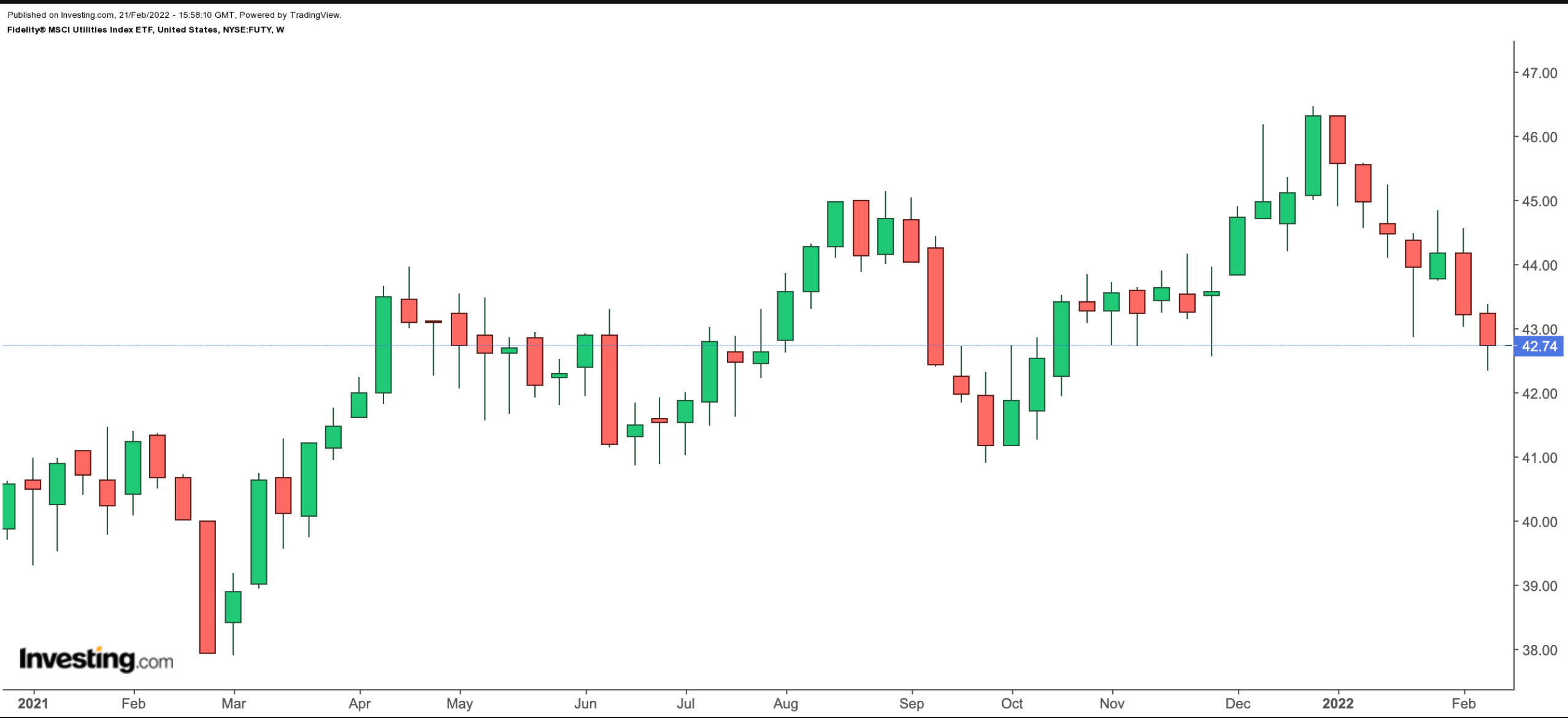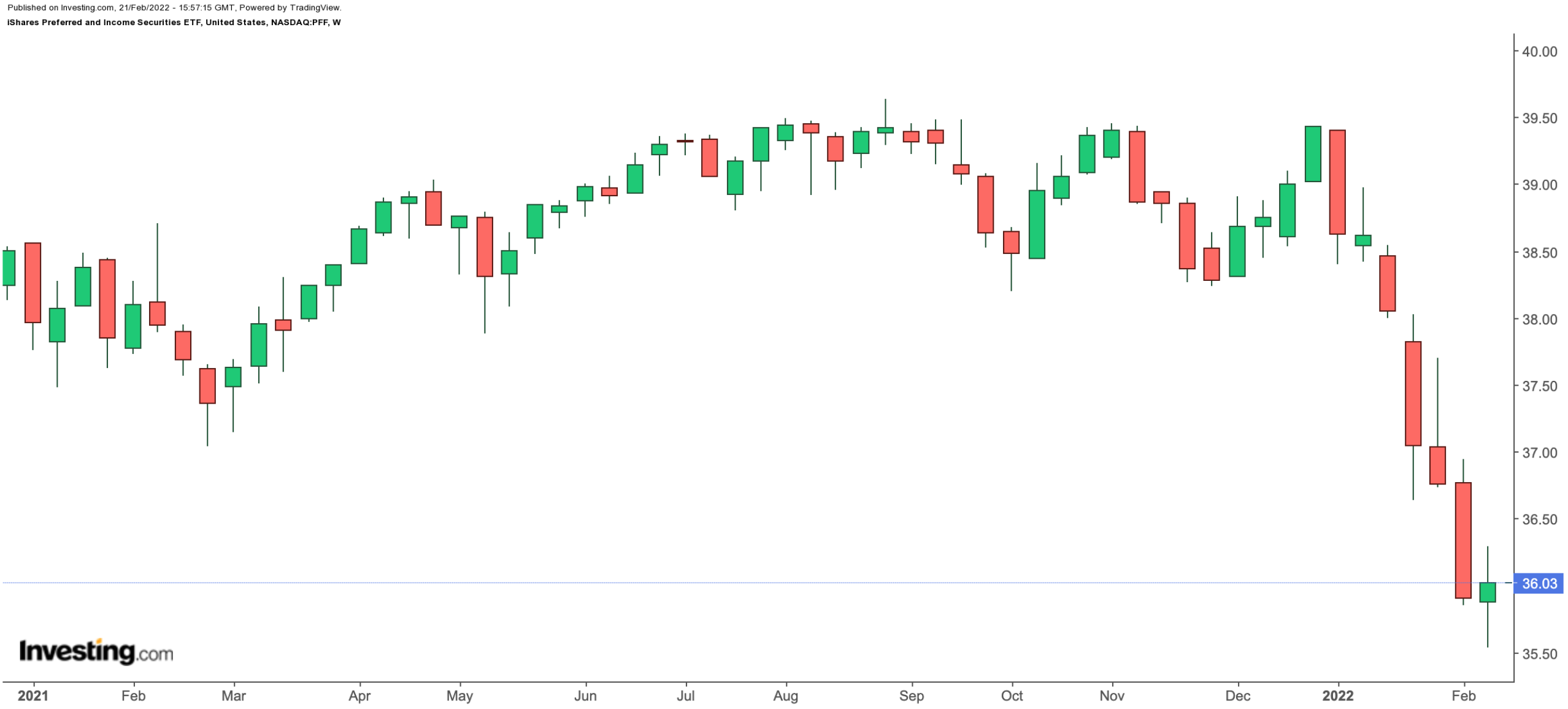InvestingPro’s Fair Value model captures 63% gain in Steelcase ahead of acquisition
Escalating geopolitical tensions in Eastern Europe have added to recent market volatility. And with the probability of harsher sanctions against Russia now in play, after President Vladimir Putin opted late Monday to increase his threats against Ukraine rather than aim for a diplomatic solution to the stand-off, market action could become even more mercurial.
Add to that worries over interest rate hikes, red-hot inflation levels and even the ongoing impact of the pandemic which remains a factor for global markets. The current earnings season has also provided its own frustrations as some growth names, especially a number of tech darlings, have disappointed. Thus, since January, the S&P 500 and NASDAQ 100 have declined around 8.6% and 14.2%, respectively.
Though US equity and bond markets were closed on Monday for the Presidents' Day holiday, on Tuesday morning, at time of writing, Asian benchmarks and US futures contracts have already reacted to the escalation of military tensions. And it's likely the US session will be pressured by the geopolitical events as well.
At times like these, diversification and alternative hedging strategies can help investors protect their portfolios from the turmoil caused by the unknown. Defensive assets offer cautious investors a choice for protecting capital and generating returns.
Most individuals who want to safeguard their portfolios against large drawdowns typically look at gold and other precious metals as well as commodities, hybrid securities that have the characteristics of both equities and debt, and last but not least, defensive stocks.
Recent academic research highlights:
"...defensive stocks would provide hedge (insurance) against uncertainty. This stance is attributable to the fact that they provide consistent and stable earnings, irrespective of the phase of the business cycle... Typical examples of defensive stocks include utility and essential retail stocks."
With that said, today’s post introduces two defensive exchange-traded funds (ETFs) that could appeal to investors seeking a hedge against continued market worries.
1. Fidelity MSCI Utilities Index ETF
- Current Price: $42.74
- 52-Week Range: $37.91-$46.47
- Dividend Yield: 2.92%
- Expense Ratio: 0.08% per year
Our first fund, the Fidelity MSCI Utilities Index ETF (NYSE:FUTY), provides exposure to US utility names. The fund started trading in October 2013.

FUTY, which tracks the returns of the MSCI USA IMI Utilities Index, has 67 holdings. The leading 10 holdings account for almost 54% of net assets of $1.2 billion.
In terms of sub-sectors, we see electric utilities with 59.36%, followed by multi-utilities (27.8%), water utilities (4.54%), gas utilities (4.53%), and independent power and renewable utilities (3.4%).
NextEra Energy (NYSE:NEE), Duke Energy (NYSE:DUK), Southern (NYSE:SO), Dominion Energy (NYSE:D) and Exelon (NASDAQ:EXC) are among the leading names in the fund.
FUTY hit a record high on Dec. 31, 2021. But the fund is down more than 7.5% year-to-date (YTD). Still, it returned over 5.3% in the past 12 months. The ETF currently trades at 2.24x book and 2.72x sales values. Its trailing price-to-earnings (P/E) ratio stands at 24.69x.
Given the recent decline in FUTY as well as in many utility stocks, investors continue to debate whether the sector is now out of favor. On the other hand, some point out that utilities are typically “safe havens” in times of uncertainty.
We expect future weeks to bring relief to utilities that have come under pressure. Therefore, potential investors could regard a decline toward $42 as a better entry point into FUTY.
2. iShares Preferred and Income Securities ETF
- Current Price: $36.03
- 52-Week Range: $35.54-$39.64
- Dividend Yield: 4.77%
- Expense Ratio: 0.46% per year
The iShares Preferred and Income Securities ETF (NASDAQ:PFF) invests in US preferred stocks—a type of instrument and related ETFs we've covered previously. These hybrid securities combine the characteristics of both common stocks and bonds. This fund was first listed in March 2007.

PFF, which currently has 503 holdings, tracks the ICE Exchange-Listed Preferred & Hybrid Securities Index. The top 10 names in the fund comprise roughly 14% of net assets of almost $18 billion.
This ETF is heavily weighted toward financial institutions (61.50%), followed by industrials (24.09%) and utilities (13.76%). Leading holdings include the semiconductor group Broadcom (NASDAQ:AVGO), financial heavyweights Wells Fargo (NYSE:WFC) and Bank of America (NYSE:BAC); medical and industrial products manufacturer Danaher (NYSE:DHR); and NextEra Energy.
PFF hit a 52-week low in mid-February. It is down 4.4% over the past year and more than 8.6% since the start of 2022. P/E and price-to-book (P/B) ratios stand at 11.26x and 1.41x, respectively.
The ETF also offers an attractive yield of 4.77%. A stable passive income stream is likely to appeal to a range of readers in 2022. Therefore a fund like PFF deserves further research.
